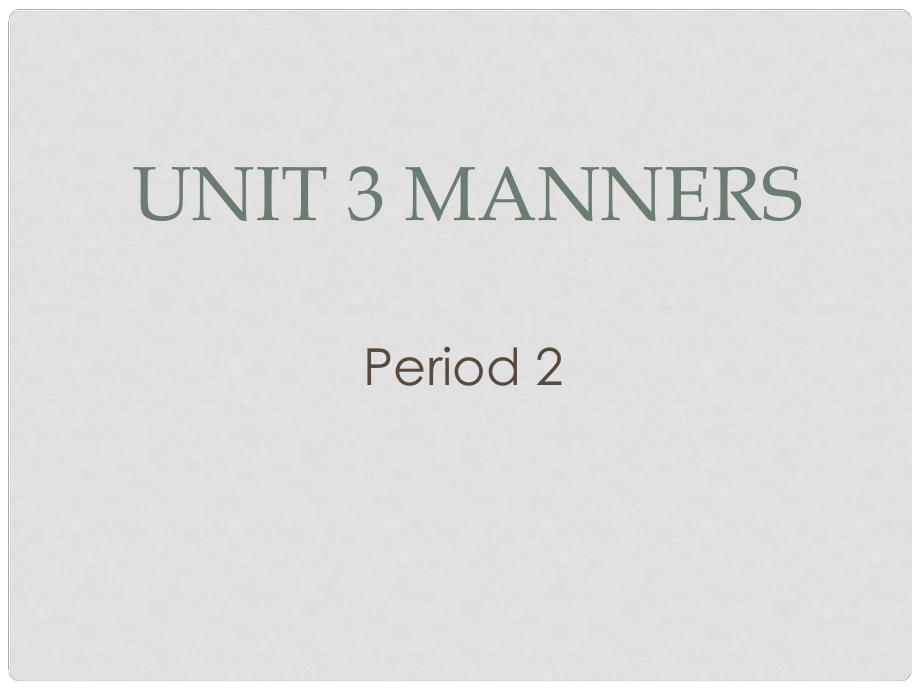《高一英語上冊 unit 3 Manners Period 2課件 上海新世紀(jì)版》由會員分享����,可在線閱讀,更多相關(guān)《高一英語上冊 unit 3 Manners Period 2課件 上海新世紀(jì)版(25頁珍藏版)》請?jiān)谘b配圖網(wǎng)上搜索��。
1�、UNIT 3 MANNERSPeriod 2 .Bad BadBadBadGood MANNERS IN CHINAMANNERS IN WESTERN COUNTRIESadj. (1) 完美的a perfect car 完美無缺的車子a perfect gentleman 十全十美的紳士(2) 完全的a perfect stranger 完全陌生的人(3) 最恰當(dāng)?shù)模焕硐氲淖钋‘?dāng)?shù)?�;理想的perfect for sth. 對對最適當(dāng)最適當(dāng)/理想的理想的a man perfect for this job 這份工作最適當(dāng)?shù)娜诉@份工作最適當(dāng)?shù)娜诉x選eg: It was a perfect da
2���、y for a picnic.那是野那是野餐最理想的天氣。餐最理想的天氣��。 adv. 完美地�;完全地VOCABULARY adj.(1). 舌頭短的舌頭短的(2). (因膽怯、難堪等因膽怯����、難堪等)說不出話的;張口結(jié)舌的說不出話的�����;張口結(jié)舌的(+with)他氣得一句話也講不出來。他氣得一句話也講不出來��。 eg: He was completely tongue-tied with rage.他站在那兒�,說不出話來。他站在那兒�����,說不出話來�����。eg: He stood there, tongue-tied.(3). 緘默的緘默的沉默的局面被突然打破了�。沉默的局面被突然打破了。 eg: A tongu
3�����、e-tied silence was suddenly broken. v. 講�����,說講,說 ( = say )進(jìn)午餐時(shí)�,進(jìn)午餐時(shí), 她一言不發(fā)�����。她一言不發(fā)�����。 eg:She didnt utter a word during lunch. 他看著我�����,沒說一句話�。他看著我,沒說一句話�����。 eg:He looked at me without uttering a word.utter a cry發(fā)出叫聲發(fā)出叫聲utter adj. 完全的��;十足的��;徹底的完全的�����;十足的���;徹底的 utter darkness 一片漆黑一片漆黑an utter fool 徹頭徹尾的傻瓜徹頭徹尾的傻瓜utterance n
4����、. 出聲�����;話語出聲��;話語4. n.(1) 羞恥����,慚愧(羞恥,慚愧(不可數(shù)名不可數(shù)名詞詞)他無羞恥之心��。他無羞恥之心�。 He has no shame.他因羞愧而低頭。他因羞愧而低頭����。 He hung his head in shame. 為為 感到羞感到羞恥恥這些學(xué)生因?yàn)榭荚囎鞅锥械叫呃?����。這些學(xué)生因?yàn)榭荚囎鞅锥械叫呃ⅰ?eg: The students felt great shame at having cheated in the test. (2) 可恥的事�;遺憾�、惋惜的事(可恥的事;遺憾���、惋惜的事(可數(shù)名詞可數(shù)名詞)我覺得這么做是一件可恥的事�����。我覺得這么做是一件可恥的事�����。 eg:
5�、I think it a shame to behave like that.5. n. (1) 建議建議 tips on sth.幾個(gè)省錢的竅門兒幾個(gè)省錢的竅門兒useful tips on how to save money(2) 尖兒���,端����;小費(fèi)尖兒�,端;小費(fèi) 手指尖手指尖the tip of a finger話到嘴邊(卻一時(shí)想不起來了)話到嘴邊(卻一時(shí)想不起來了) have (sth.) on the tip of ones tongue(問題的)冰山一角���,端倪(問題的)冰山一角����,端倪the tip of the iceberg我給了那個(gè)替我拿箱子的人一點(diǎn)小費(fèi)��。我給了那個(gè)替我拿箱子的人一
6�、點(diǎn)小費(fèi)。 eg: I gave a tip to the man who carried my cases. v. 傾倒�;給小費(fèi)傾倒;給小費(fèi)我把瓶子弄翻了��,瓶子摔破了��。我把瓶子弄翻了�,瓶子摔破了。 eg: I tipped the bottle over and it broke.(1 1)基本形式:)基本形式: to+動詞原形動詞原形 (在某些情況下可以不帶(在某些情況下可以不帶 to)(2 2)特點(diǎn))特點(diǎn) : A .A .沒有人稱和數(shù)的變化沒有人稱和數(shù)的變化C . 有時(shí)態(tài)和語態(tài)的變化(被動語態(tài)的形有時(shí)態(tài)和語態(tài)的變化(被動語態(tài)的形式為式為 to be + 動詞過去分詞)動詞過去分詞)B .
7���、可以有自己的賓語和狀語可以有自己的賓語和狀語 動詞不定式動詞不定式A���、作主語、作主語���,如 To learn a foreign language is not easy . It is good others. 幫助他人是件好事�����。 It is exciting the Internet. 上網(wǎng)是件令人興奮的事�����。 to helpto surf= Its not easy to learn a foreign language.動詞不定式用法動詞不定式用法B���、作表語�、作表語��,如The important thing is to finish the work on time . What you
8��、have to do now is (打掃教室)to clean the classroom 動詞不定式動詞不定式C 作賓語作賓語 1) 動詞動詞 + to do常見動詞有常見動詞有 agree, decide ,fail, hope, wish , want, plan 等等1 He decided (buy) the camera.to buy 2 I want (listen to) some music after class.to listen to 3 I hope (travel) all over the world one day.to travel動詞不定式動詞不定式2)
9�、動詞動詞+疑問詞疑問詞 + to doI dont know what to do . how to do it/that. (去哪里) (什么時(shí)候出發(fā)) (選擇哪個(gè))Where to go When to leave Which one to choose動詞不定式動詞不定式3) 動詞動詞 + it(形式賓語)形式賓語)+賓補(bǔ)賓補(bǔ) +to doI find it important to learn English我發(fā)現(xiàn)很難和他好好相處.我發(fā)現(xiàn)在炎熱的夏天很容易入睡I find it hard to get on well with him .I find it easy to fall a
10、sleep in hot summer.動詞不定式動詞不定式1) 動詞動詞 + 賓語賓語 +to do Li Mei asked me to show her the new dictionary .注:有以上結(jié)構(gòu)的常用動詞有注:有以上結(jié)構(gòu)的常用動詞有 tell. wish, ask, want like, beg, invite,warn, allow,encourage,advise 等�。等。2) 動詞動詞 + 賓語賓語 + do(不帶不帶 to 的不定式的不定式)注:常用的動詞是注:常用的動詞是:感官動詞感官動詞see, hear, feel, watch, notice����; 使役動詞使役
11、動詞 have ,make, let.動詞不定式做賓補(bǔ)動詞不定式做賓補(bǔ)E����、作狀語、作狀語可以表目的��、表結(jié)果�、表原因可以表目的、表結(jié)果�����、表原因F��、作定語��、作定語(必須后置)(必須后置)I came here ( 告訴你一個(gè)好消息)to tell you a good newsWe have a lot of homework to do every day.I have a good news to tell you.我們每天有很多作業(yè)要做.我有個(gè)好消息要告訴你.動詞不定式動詞不定式 在學(xué)習(xí)動詞不定式的時(shí)候還有在學(xué)習(xí)動詞不定式的時(shí)候還有兩點(diǎn)兩點(diǎn)要注意哦���!要注意哦��!1���、在、在感官動詞感官動詞和和使
12�����、役動詞使役動詞后作賓補(bǔ)時(shí),不定式后作賓補(bǔ)時(shí)����,不定式可可省略省略to,但以上詞變?yōu)榈陨显~變?yōu)楸粍诱Z態(tài)被動語態(tài)時(shí)��,要時(shí)��,要加上加上to, 如如1) I always see her play the violin .2) He was made (work) 12 hours a day.-She is always seen the violin. to playto work注意事項(xiàng):注意事項(xiàng): not + to doMr.Smith asked the boy _(not play) this kind of game. not to playPlease tell her _(not d
13��、o) so much housework. not do動詞不定式的否定形式動詞不定式的否定形式一�����、常使用動詞不定式的短語一�、常使用動詞不定式的短語 1、Its time to do sth. Its time for sth 該作某事的時(shí)候了該作某事的時(shí)候了. 2��、cant wait to do sth. 迫不及待要作某事迫不及待要作某事 3�����、ask /telle sb. (not ) to do sth. 要求要求/告訴某人告訴某人(不不)作某事作某事 4���、allow sb. to do sth. 允許某人作某事允許某人作某事 5�、be supposed to do sth. 應(yīng)該作某事應(yīng)
14�、該作某事 6����、Would like /want (sb.) to do sth. 想要作某事想要作某事 中考重點(diǎn)句型中考重點(diǎn)句型7�、have sth/nothing to do 有有時(shí)要做時(shí)要做/與與無無關(guān)關(guān) 8、find it +adj. to do sth. 發(fā)覺作某事發(fā)覺作某事 9����、prefer to do sth. rather than do sth. 寧愿作某事寧愿作某事,而不愿作某事而不愿作某事 10、Its +adj. for sb. to do sth. 作某事對某人來說作某事對某人來說 11�����、Its better /best to do sth. 最好做某事最好做某事 12
15�、�、It takes sb. sometime. to do sth. 某人做某事用了一些時(shí)間某人做某事用了一些時(shí)間 中考重點(diǎn)句型中考重點(diǎn)句型1 1、一看二聽三使役����、一看二聽三使役 see/ hear/ feel/ notice/ look at /listen to sb. do see/ hear/ feel/ notice/ look at /listen to sb. do sth. sth. 看看見見/ /聽聽見見/ /感感覺覺/ /注意某人作某事注意某人作某事 make /let /have sb. do sth. make /let /have sb. do sth. 使使/ /讓
16���、讓某人做某事某人做某事 2 2、help sb. (to) do sth/ with sth.help sb. (to) do sth/ with sth.幫幫助某人作某事助某人作某事 3 3�、 had better (not) do sth. had better (not) do sth. 最好最好( (不不) )做某事做某事 4 4、 Why dont you/ not do sth.Why dont you/ not do sth.為為什什么么不作某事不作某事 5 5�����、Would /Will / Could you please (not) do sth. Would /Will /
17�����、Could you please (not) do sth. 請你請你( (不不) )作某事好作某事好嗎嗎? ? 省略動詞不定式的短語省略動詞不定式的短語studiesTo improveto maketo speakcomesto startto getto liketo beto talk1. John was made _ the truck for a week as a punishment. A. to wash B. washing C. wash D. to be washing 2. Tell him _ the window. A. to shut not B. not t
18�����、o shut C. to not shut D. not shut 3. Mrs Smith warned her daughter _ after drinking. A. never to drive B. to never drive C. never driving D. never drive 4. Though he had often made his little sister _, today he was made _by his little sister. A. cry���;to cry B. crying��;crying C. cry����;cry D. to cry;cry 5. I would love _ to the party last night but I had to work extra hours to finish a report. A. to go B. to have gone C. going D. having gone ABAAATest
 高一英語上冊 unit 3 Manners Period 2課件 上海新世紀(jì)版
高一英語上冊 unit 3 Manners Period 2課件 上海新世紀(jì)版

